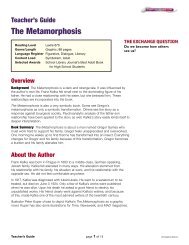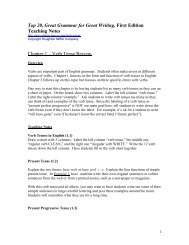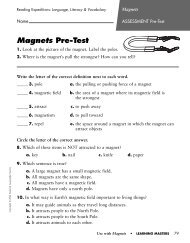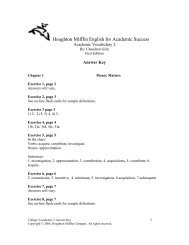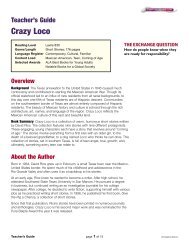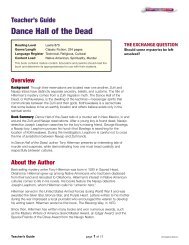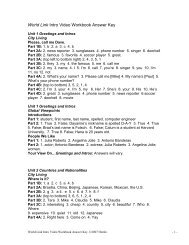English for Cabin Crew Trainer's Guide - Heinle
English for Cabin Crew Trainer's Guide - Heinle
English for Cabin Crew Trainer's Guide - Heinle
Create successful ePaper yourself
Turn your PDF publications into a flip-book with our unique Google optimized e-Paper software.
UNIT<br />
6 Is there a doctor on board?<br />
LEAD IN Speaking<br />
Write the following words on the board: faint; collapse; throw<br />
up; have a heart attack; feel dizzy; feel airsick; have an anxiety<br />
attack. Check the meaning of the words and then ask students<br />
which of these medical incidents they have experienced.<br />
Dealing with a serious medical incident<br />
EXERCISE 1 Speaking<br />
Check the difference between a medical incident (something that happens<br />
– an asthma attack, <strong>for</strong> example) and an accident (a happening that<br />
involves receiving injuries – a fall or a crash, <strong>for</strong> example). Ask students<br />
to work in pairs or small groups to discuss the questions. Get feedback in<br />
open class and encourage students to share their personal experiences.<br />
Pre-teaching vocabulary<br />
Check the following key words: medical kit (pack with emergency medical<br />
supplies in); weak (not strong); shallow (not deep).<br />
EXERCISE 2 Listening<br />
Give students time to read the situation and the questions. Ask, What<br />
can you guess about the situation from the questions? Play the recording.<br />
Students listen and then discuss their answers in pairs. Get feedback in<br />
open class at the end.<br />
Answers<br />
1 T 2 F – he is travelling with his wife. 3 F – she wants to put him on<br />
the fl oor. 4 F 5 T 6 F – they need a doctor. 7 T – he is a diabetic<br />
and has injections. 8 F – he is 63. He’s been tired recently. 9 T 10 F<br />
Cultural note<br />
Delhi is a city in northern India. Colombo is a city in Sri Lanka.<br />
EXERCISE 3 Vocabulary<br />
Give students time to read the sentences and write in any words they<br />
think they know. Ask, What part of speech are the missing words? Play<br />
the recording again if students are unclear about any answers. Students<br />
listen, complete the remaining gaps and then check in pairs. Get<br />
feedback in open class at the end. You could ask students to practise<br />
saying the phrases in pairs.<br />
Answers<br />
1 hear 2 heart 3 breathing 4 get 5 mask 6 care 7 administered<br />
8 pulse<br />
EXERCISE 4 Speaking<br />
Ask students to discuss the questions in pairs or small groups. Get<br />
feedback in open class at the end.<br />
Pronunciation notes<br />
Note the pronunciation of heart /ha:t/ and pulse /pVls/.<br />
GIVING INSTRUCTIONS TO CREW Language focus<br />
Give students time to read through the phrases in the box. Alternatively,<br />
read out the phrases and ask students to read and follow.<br />
Language notes<br />
Note the use of the imperative here (Get ..., Tell ..., Make ...). Note the<br />
structure Get (someone) to do (something) which means tell or persuade<br />
someone to do something.<br />
Grab means take quickly with urgency.<br />
EXERCISE 5 Pronunciation<br />
Play the recording. Students listen and repeat.<br />
Pronunciation notes<br />
The imperative <strong>for</strong>m is strongly stressed in each sentence.<br />
Pre-teaching vocabulary<br />
Check the following key word: diagnosis (doctor’s decision about what is<br />
wrong with a patient).<br />
EXERCISE 6 Listening<br />
Give students time to read the situation and the questions. Ask, What<br />
do you think will happen in this situation? Play the recording. Students<br />
listen and then discuss their answers in pairs. Get feedback in open class<br />
at the end.<br />
Answers<br />
1 that the man is going into cardiac arrest 2 yes 3 that they divert<br />
the plane to the nearest hospital without delay 4 The captain will<br />
contact ATC and arrange to land at the nearest airport.<br />
Pre-teaching vocabulary<br />
Check the following key words: diversion (change of route and<br />
destination); cooperation (helpfulness).<br />
EXERCISE 7 Listening<br />
Give students time to read the announcement and guess the missing<br />
words. Play the recording. Students listen and then discuss their answers<br />
in pairs. Get feedback in open class at the end.<br />
Answers<br />
1 important 2 divert 3 nearest 4 prepare 5 anticipate 6 remain<br />
7 inconvenience 8 updated<br />
EXERCISE 8 Pronunciation<br />
Play the recording. Students listen and repeat. Then ask students to work<br />
in pairs to practise reading the announcement.<br />
Pronunciation notes<br />
Be<strong>for</strong>e asking students to practise reading the announcement, you could<br />
get them to analyze it <strong>for</strong> pausing and stress. They should mark up the<br />
text as shown below:<br />
Ladies and gentlemen, // if there is a doctor on board, // please make<br />
yourself known // to a member of the crew immediately // by pressing<br />
your call bell. // Thank you.<br />
EXERCISE 9 Speaking<br />
Ask students to work in groups of four. Each group must decide who<br />
will play the ill passenger and his/her friend, who will play the fl ight<br />
attendant and who the purser. Give students preparation time. The<br />
passengers must chat and decide what the medical problem is going to<br />
be and what they could say. The fl ight attendants should, meanwhile,<br />
look back at language in the unit and think about what they should say<br />
in a medical emergency.<br />
When each group is ready, ask them to act out their role play. Then ask<br />
them to change roles and act out a different situation. Monitor, prompt<br />
students to use the imperative correctly, and feedback on good examples<br />
of language use and errors you heard. You could choose a good group to<br />
act out one of their role plays <strong>for</strong> the class at the end.<br />
ROUND UP<br />
Give students further practice of making emergency announcements<br />
by asking pairs to analyze the text in exercise 7 <strong>for</strong> stress, pausing<br />
and intonation. Once they have marked up the text (as shown in the<br />
notes above <strong>for</strong> exercise 8), ask pairs to take turns reading it out.<br />
25



